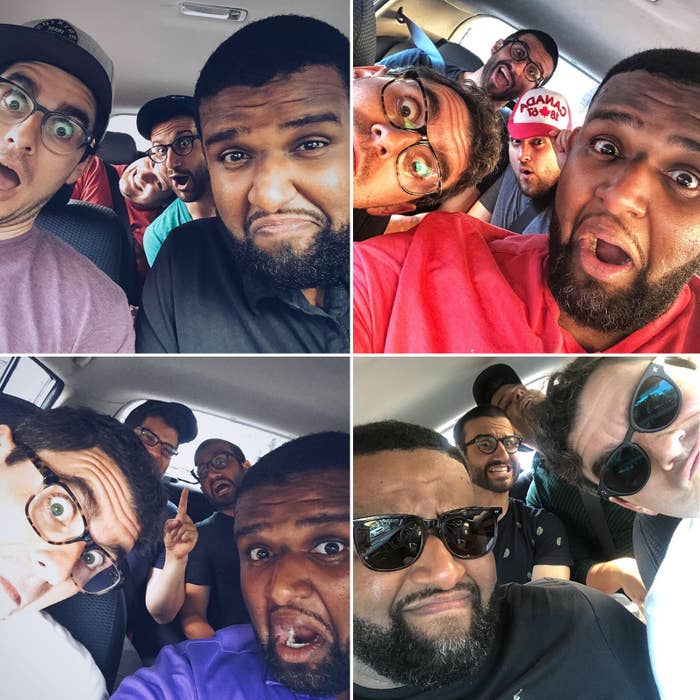A road trip is an act of will: You have to opt into it and choose its shortcomings. As far as modes of travel go, it ranks below the convenience of airplane travel and the romance of the train, but hovers just above the awful hell that is traveling by bus.
But what the road trip lacks in amenities, it makes up for in intimacy. It is a crash course in tolerating the quirks, weariness, moodiness, music tastes and food preferences, and other eccentricities of your companions. Late last month, just like I have done for the last eight summers, I went on a road trip with three guy friends. It’s a sacred part of our year — something we plan our summers around. For nearly a decade, we have picked a destination and then piled into a car every summer and driven. For nearly a decade, we’ve chosen to enmesh our lives, building a scaffolding of intimacy that not even a global pandemic could threaten.
The destination is usually somewhat beside the point. Our annual road trip has taught us a lesson that we’ve learned and relearned: how to stretch toward each other, how to adjust expectations, and how to make space in order to accommodate each other.
I met Eric and Harrison first, when I briefly worked for a public broadcaster. I immediately took to the pair, with their easygoing natures and senses of humor. Eight summers ago, we took a one-off trip to Nashville, a city I’d always wanted to visit because of my love for country music, and they thought it would be fun to come along. We enjoyed traveling together so much that the following summer, we decided we’d visit Boston. The year after that, Matt — who I’d met through Eric — joined. And for the last six years, the four of us have kept the road trip tradition alive.
We’ve been to Philadelphia and Columbus. We’ve been to Pittsburgh, and none of us is entirely sure why. We’ve been to Cleveland and found out that “Cleveland Rocks” is taking a bit of creative license. In between these cities, we’ve stopped at dozens of gas stations and countless roadside attractions. Did you know that Neil Armstrong’s hometown — Wapakoneta, Ohio — has a museum named after him? It’s home to two space suits and a moon rock. We’ve invented new games to play in abandoned parking lots where we pull over to stretch our legs.
For at least the last decade, there has been mounting anxiety about the state of friendship between men. Men are having a difficult time maintaining meaningful, intimate friendships with each other. It’s not that men don’t know other men; rather, they don’t talk to other men about their deepest problems — and as a result, women alone have had to take on that labor.
Although this was a problem before COVID-19 came, the pandemic has made this phenomenon much worse. Some research suggests that while women succeed at face-to-face relationships, men are more accustomed to what is called “shoulder-to-shoulder” friendships: They gather around an activity. Deprived of bars, game days, and other conventional avenues for gathering, many men have suddenly been confronted with the need to form deeper bonds through sitting and talking.
But here’s the thing about road trips: All there is is sitting and talking. There’s plenty of hours in the car to just sit and talk, and sometimes not talk, but then you eventually go back to talking. Over eight years of practice, the four of us have built an environment where it feels more unnatural to not talk. And we’ve become so protective of that.

The start of the road trip process is always the same: We each pitch a city and then begin the deliberations. The ideal destination is a US city, within reasonable driving distance, that we probably wouldn’t get a chance to visit if we don’t go out of our way to find. So: No New Yorks or San Franciscos or Los Angeleses. Slowly, consensus begins to swing in one direction. Then follows the stress of picking the dates. Every year, the busyness of our separate lives threatens the continuity of the road trip. Eventually, someone says, “It looks like we just can’t make it work this year.” It’s usually after we reach this conclusion that we begin to gradually become more flexible until we do, in fact, make it work.
For this year and last, however, we’ve had to change our idea of what the road trip entails. Instead of our usual 10-hour drive radius, the four of us have needed to work within the limitations enforced by the pandemic. That has meant planning shorter drives to small towns just outside of Toronto, where we all live. In 2020, we picked Fort Erie, a small beach town on the Canada–US border, partly as a nod to the fact that the border is closed and this was as close as we were going to get to crossing it for the foreseeable future. This year, our destination was a beautiful cottage surrounded by wineries in Prince Edward County. With everything still closed because of the pandemic, Matt and Eric took on the labor of cooking us extraordinary meals for the duration of the trip.
The road trip has remained through the shines of new relationships and the weight of heavy breakups; through the frustrations of old jobs and the excitement of finding new work.
But then again, the road trip has always been changing with us, shifting to what we need it to be at the time. In 2017, six months after Trump’s ban of foreign nationals from seven predominantly Muslim countries, we weren’t sure if I’d be able to get into the US, as I was born in one of the countries on the list. I was anxious about what would happen if we even tried to approach the border, so that year, we chose Quebec City as our destination — still within Canada, but a long enough trip to feel like a substantial journey. That wasn’t even the only act of accommodation that year: The 2017 road trip was three months after I became a parent, and the guys took turns reassuring me when I felt anxious about being away from my daughter for the first time.
There have been deeper changes, still: During our first trip, one of us drank enough bourbon to run into the woods in East Nashville, screaming (no one is sure about what, exactly). Eight road trips later, the drinking is intermixed with sharing new insights we might’ve picked up from our therapists. In between settling in to our Airbnbs or googling interesting restaurants, we talk through our problems and commend each other for the positive ways we’ve changed. The road trip has remained through the shines of new relationships and the weight of heavy breakups; through the frustrations of old jobs and the excitement of finding new work; through denials and reckonings; and through dark periods and sunny skies.
Yet for all the changes, some of the dynamics remain deeply familiar. Harrison and I have internal clocks that will not let us sleep past 7:30 a.m., even on vacation. He’s often anxious to get out the door and go exploring a new city or a new environment as soon as possible. Eric, however, is constitutionally incapable of waking up before 11 a.m. I am psychologically incapable of not taking 70 to 90 minutes to shower and get ready. Matt works in a high-stress job, so on vacation, he allows himself the freedom to give in to the impulse to take naps. He allows himself the freedom to give in to every impulse to take a nap.
There is art in rearranging yourself to spend time with your friends when you each have different needs. There is, of course, also chaos: Without fail, on the last day of each road trip, Harrison and Eric will get into a shouting match over tidying up. This year, as they descended into their annual argument, I found myself grinning. In the midst of a global pandemic that has changed everything about the last 16 months and has shrouded the future in great uncertainty, Eric and Harrison were arguing about cleaning up the Airbnb, and frankly, it was so familiar, it felt like home. ●

